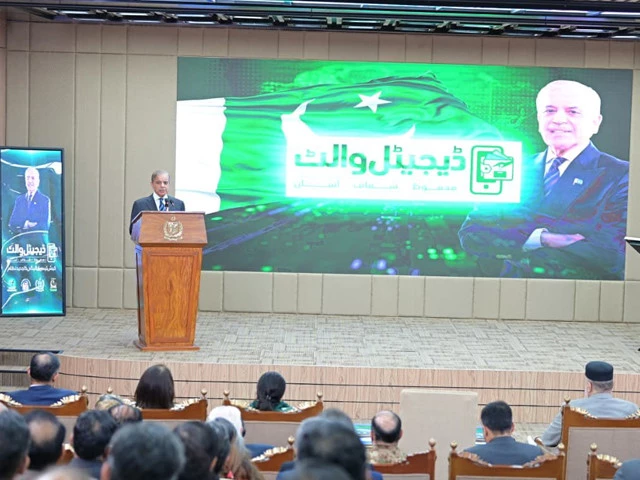Prime Minister Shehbaz Sharif on Monday launched 10 million digital wallets for Benazir Income Support Program (Bisp) recipients who described the move as a “historic milestone” in Pakistan’s push towards transparency, financial inclusion and a cashless economy.
With a symbolic Palme Touch, the Prime Minister inaugurated the system in the presence of federal ministers, bisp officials and international partners, including Giz, Radio Pakistan reported.
He congratulated the Bisp chairman Senator Rubina Khalid and partner institutions with “Landmarks -Decision that will protect real recipients and protect them from unnecessary difficulties.”
“The digital wallet system is in its true sense blessed by the soul of Shaheed Mohtarma Benazir Bhutto as it gives Bisp recipients to secure, transparent and direct access to financial assistance,” said Prime Minister Shehbaz.
He described Bisp as a “major initiative for poverty reduction and employment generation”, and emphasized that further efforts were needed to expand its influence.
The prime minister called the launch “a big leap against a cashless economy” and remembered that 78 percent of the aid package under Ramazan was successfully paid digitally despite skepticism and resistance from overall interests.
“Cashless transactions are the urgent requirement of our times. They save time, conclude corruption and bring efficiency, which helps Pakistan move on quickly,” he said.
PM Shehbaz added that he personally had chairman of several meetings on digitization despite the first “indifferent attitudes and boredom” and emphasized his commitment to transforming government, business and personal transactions into digital channels.
He urged Bisp leadership to connect support to education and health conditions. “If a family receives help, it must be linked to the condition that all children in this household go to school. Similarly, health initiatives must be bound with Bisp support. Only then will this program become a true heritage that benefits millions of children,” he said.
Premier also called to reduce the current eight to ten-month implementation cycle to four months and pay tribute to stakeholders, including the State Bank of Pakistan, the IT Ministry, local banks and development partners. “We are not just paying help, we are raising an army of architects and workers to build the nation,” he added.
Usion ر راس: زیراظم کا ڈیجیٹل Car و کے verse
– Pakistan’s government (@govtofpakistan) 25 August 2025
Previously, Bisp-Føde Secretary Amir Ali Ahmed said a high-level selection was formed to ensure transparency and easy access. “After today’s launch, 10 million digital wallets will be developed using the recipients CNICS, supported by a biometric verification system to prevent identity theft,” he said.
He added that 10 million free SIM cards would also be distributed with the first phase in progress in Hyderabad, Sukkur and Rahim Yar Khan.
Bisp chairman Senator Rubina Khalid called launch an “important and historic milestone” and said the program that supports over 10 million families was “not just financial assistance, it’s a path to social and economic empowerment.”
She noted that the interconnection of benefits to women’s CNICs gave them recognition in the national database and said the new wallets would be supplemented with digital literacy programs for women who do not know technology.
Senator Rubina highlighted that Bisp continued the vision of Shaheed Benazir Bhutto for Women’s Empowerment, performed by President Asif Ali Zardari and now “is further distinguished by Prime Minister Shehbaz Sharif’s leadership.”
PM Shehbaz has repeatedly emphasized the importance of a cashless digital economy. Last week, at a meeting, he said the government is prioritizing efforts to digitize Pakistan’s economy and switch financial transactions to a cashless system.
While he was chairman of a review meeting on the cashless economy in Islamabad, he instructed provincial chief secretaries to fully cooperate with the federal government to expand Raast Digital Payment system to district level.
Read more: PM Shehbaz prioritizes shifts to cashless economy
Sharif expressed satisfaction with the progress made against a cashless economy and the development of digital financial systems.
Officials informed the meeting that Pakistan will build digital public infrastructure to give any citizen a digital ID that integrated national identity cards, biometrics and mobile numbers. These IDs enable safe and effective payments.
The briefing added that provincial governments have made progress in linking payments to public and public to the government with the Raast system.
Authorities further informed the meeting that federal development agencies have given the right to the way to fiber connection, while discussions with Pakistan Jernbaner and National Highway Authority are underway to expand digital infrastructure.



